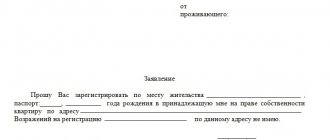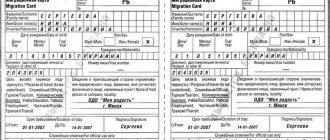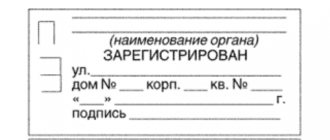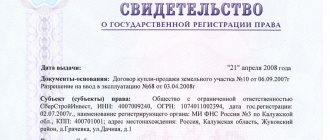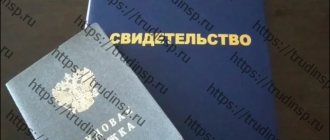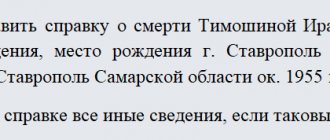What is Form 8 about the registration of a child and why is it needed?
Form 8 is a unified document confirming the child’s registration . This document is second in importance after the birth certificate, so it is necessary to obtain it as soon as possible after the birth of the child.
The certificate form was developed and approved by the Russian Government; the norms and standards of the form are also enshrined in law. In this regard, filling out a document “in free form”, especially on your own letterhead, is prohibited.
The purpose of this paper is that only with the help of a registration certificate can a child be given a share in real estate. In addition, this document is immediately sent to the Main Directorate for Migration Affairs of the region or federal subject. Thus, the state, including guardianship and trusteeship authorities, can monitor the child’s condition, the presence or absence of offenses against him, etc.
If we talk about the practical usefulness of a certificate in Form 8, then it should be noted:
- The registration certificate is the main document for admission to a public school or kindergarten. The paper is necessary because all public schools and kindergartens are tied to certain areas. The certificate can confirm that the child lives in the required place for his placement in school or kindergarten.
- Based on the registration certificate, later, upon reaching the child’s 14th birthday, the child will be issued a passport. When obtaining an internal passport of the Russian Federation, a certificate of registration is no less important than a birth certificate.
- Without a certificate, mothers are not issued child benefits and maternity capital by government agencies.
- The document is required to register a minor at a local clinic. Like schools/kindergartens, public clinics are also tied to certain areas. Therefore, without a certificate, it is impossible to register a child, which can lead to delays in receiving medical care if necessary.
The contents of the registration certificate include the following information::
- Full name and date of birth of the child.
- Address of the child's place of registration.
- Details of the document on the basis of which Form 8 was issued - birth certificate.
- The name of the institution where the certificate was received with all the necessary signatures and seals.
- Employees of the authorized institution also develop a unique registration number assigned to the certificate. This number is entered into the GUVM database. It is located at the very beginning of the document, its “header”.
Note! The certificate must contain the initials, surname and personal signature of the employee who issued the certificate to the parents.
In addition, the certificate must bear the official seal of the administrative institution where the document was issued . Otherwise, the document has no legal force. The corresponding seals and signatures are placed on the document after its examination by authorized employees.
Sample certificate of registration of a child at the place of residence (form 8):
How to obtain a Form 8 certificate from the MFC: step-by-step instructions
Certificate No. 8 about the child’s registration is the second most important document after the birth certificate; it must be completed without fail after the birth of the baby, for this:
- Make an appointment at the nearest MFC branch by calling the hotline, or upon arrival at the center, take an electronic queue coupon at the terminal
- Submit the package of necessary documents to the specialist
- Receive a receipt confirming their acceptance
- Pick up the finished document
Read also: How to get a TIN via the Internet (Government Services, Federal Tax Service)?
After the employee of the multifunctional center accepts the documents from you, issues a receipt; you can use the number indicated in it to track the readiness of the certificate.
What documents are needed
Before going to the MFC, be sure to take the following documents with you:
- Your (parent’s) passport with a mark of registration at the place of residence
- Baby's birth certificate
- Document confirming ownership of housing (extract from the Unified State Register, certificate)
- If the certificate is prepared by a third party, it is necessary to issue a power of attorney and notarize it
Cost and terms of receipt
As a rule, an employee of the center informs about the timing of the production of any documents, but if this does not happen, from practice this certificate will be ready and issued on the day of application. No money is charged for receiving it at the MFC; the document is issued absolutely free of charge.
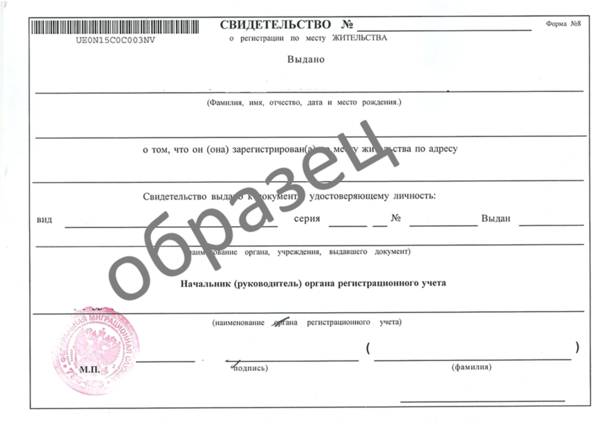
Certificate Form 8 (sample)
Who can get it?
According to the legislation of the Russian Federation (Family Code of the Russian Federation), not only parents can receive a certificate in Form 8. The child's legal representatives have the right to receive this document.
Legal representatives include:
- The child's parents , even if they are divorced or registered separately. Either one parent or both can apply for a certificate.
- Guardians of a minor - these can be, for example, relatives of the orphan after guardianship has been formalized or adoptive parents after going through the adoption procedure.
- Third parties who have received a notarized power of attorney in their name from their legal representatives. For example, a child’s parent cannot be in the city where they live due to a long business trip.
In this case, he can draw up a power of attorney with a notary in the name of his friend or relative. The person who has this document has the right to receive services in full if this is provided for by the power of attorney (the contents of the paper indicate what exactly the authorized person can do - for example, obtain a certificate from government agencies).
How is a certificate of registration at the place of residence of a minor issued?
Where can I get a certificate?
Let's look at where you can get a Form 8 certificate about your child's registration.
You can obtain the document at any territorial office of the Main Directorate for Migration and Migration at your place of residence . Previously, the document was issued by the Federal Migration Service, but the FMS has recently been abolished; Most of the functions and powers of this body were transferred to the Main Directorate for Migration. This also applies to the issuance of a certificate.
In addition, if the child’s parents live in a small locality, it is possible to contact the nearest MFC rather than the territorial office of the Main Directorate for Migration, where they also review documents and issue certificates.
What papers will be required?
The list of documents required for submission is approved by Decree of the Government of Russia No. 713 of July 17, 1995 and the “Administrative Regulations” approved by Order of the Federal Migration Service No. 984.
The list specified in both legislative acts is exhaustive, i.e. representatives of the GUVM do not have the right to request additional papers outside the approved list :
- Application from legal representatives for registration of a child at the place of residence.
- Original birth certificate.
- Title documents for the property where the child is moving in - for example, a certificate of registration of real estate.
- Marriage certificate, if documents are submitted by existing spouses.
- Internal passport of the Russian Federation from a legal representative. If there are two parents or guardians when submitting an application, the document can still be provided by only one representative (if desired).
- In some cases, written consent of parents may be required to register their child for migration registration. As a rule, it is required if the child is registered under a power of attorney; it may also be required if the parents live separately from each other. The requirement to provide a passport and written consent is enshrined in the “Administrative Regulations” dated September 11, 2012.
After all documents are accepted, their review begins. A completed certificate with all the necessary stamps and signatures is issued within a week from the date of application. In this case, the paper is issued in a single copy, i.e. you can request a duplicate only if the certificate is lost.
Can they refuse?
In general, cases of failure or problems are divided into three categories, each of which we will now examine in detail:
- In some situations, one of the homeowners opposes the registration of another person at the place of residence, in our case a minor.
Registration is refused if this owner is the only one and he is not the legal representative of the child. In other words, the parents do not have their own property or at least a share in it. The issue can be resolved in only one way - by acquiring at least a share in housing. If at least one parent has permanent registration at the address where the child needs to be registered, the consent of third parties is not required (read about whether it is possible to register a child without the consent of the parents and the owner of the home); - The MFC or the territorial branch of the GUVM may refuse registration if the property in which the parents want to register the child is considered dilapidated or in disrepair.
In addition, refusal may occur if the apartment is under arrest or if the parents have large debts with regular violation of obligations, and the apartment is under collateral. You can solve the problem by moving to another housing stock or buying at least a share there. It can also be documented that the housing is not considered dilapidated by the decision of the BTI (Bureau of Technical Inventory). As a last resort, if your rights are grossly violated, file a complaint with higher authorities. Further, after an attempt to peacefully resolve the conflict, the case should be sent to court - as a rule, the courts come to the defense of the parents; - Finally, registration may be refused if the child’s parents are divorced or living separately.
Employees of the MFC or GUVM are ready to accept documents, but only if one of the parents has issued a written and notarized consent to register the child. However, it often happens that parents cannot reach a consensus. In this case, they will be denied registration until they reach a consensus on the issue. In the event of a complete inability to independently resolve the conflict, the case must be referred to court: authorized employees will determine which of the parents is more capable of financially providing for the child.
It is necessary to register a child (even a newborn) within the period established by law. In addition to administrative responsibility, there may be difficulties in obtaining a place in a kindergarten or school. Read our materials about what documents are needed to register a child in an apartment, how to do this through the State Services portal, and whether it is possible to register the father or mother at the place of registration of the child.
Where can I get a certificate of registration of a child’s place of residence for school?
According to the law, the deadline for registering newborns is seven days. You can register (register) a newborn in the presence of one legal representative. These simplifications in registering newborns also apply to those cases when the parents do not have a marriage certificate, i.e. they are not officially married. The only exception in this situation is registration at the father’s place of residence; If the marriage between the parents is not registered, then the newborn cannot be registered with the father.
Even if, according to the standards of the living space where the parents of the newborn live, there are not enough square meters required for living, it will still be registered, since children born are protected by the state and cannot be citizens without a place of registration.
We recommend reading: The process of dismissal for absenteeism
What to do if the certificate is lost or damaged?
A registration certificate, like a birth certificate, is issued in a single copy . In this regard, if the document is lost, the child’s parents must appear in person at the GUVM or MFC office to re-receive a registration certificate there.
In accordance with Order No. 984, you are required to issue a duplicate free of charge if you lose your previous document. To do this, you need to submit an application to the GUVM department or the MFC at the place of permanent registration of the child. The document is assigned the same registration number that was on the previous certificate. The new document must contain a note stating that it is a duplicate of the certificate.
The maximum period for processing and issuing a document is limited to ten minutes . But this only applies to submitting an application to the GUVM department. If a citizen asks to issue a duplicate at the MFC, the maximum period increases to five working days, since all shipments during the paper production process are made using couriers.
Obtaining a child registration certificate is, at first glance, difficult. But in fact, you only need to submit the list of documents specified in the article along with the application. Applications are accepted quite easily; the employees do not find fault with minor mistakes. Therefore, the procedure for obtaining a certificate is quite simple.
However, quick registration requires preparedness, including from the point of view of jurisprudence and documentation. For this reason, we recommend that parents prepare in advance to receive a certificate so as not to waste a lot of time on this in the future.
Certificate of residence: where to get it, sample, for school, military registration and enlistment office, in case of divorce
In practice, there are refusals to issue in the presence of utility debts - such actions are illegal and can be appealed through the prosecutor's office or court. Of course, this does not mean that the debt for housing and communal services can not be paid, but the lack of timely payment cannot be a basis for refusing to provide the information necessary to a citizen.
- for registration of various benefits, compensations, benefits. For example, to obtain maternity capital or benefits for large families;
- to receive medical assistance. Sometimes, in order to receive preferential treatment or in order to register with a specific medical institution, it is necessary to provide relevant information about the place of residence;
- to go to court. During the consideration of a civil case, information about the registration of the defendant or plaintiff may be needed. Thus, during the consideration of a divorce case, the question of the residence of children may arise - to decide this, the court needs to know where and with whom each of the parents lives. In this case, the court, on its own initiative, has the right to request the necessary information;
- when contacting municipal authorities regarding the issue of improving housing conditions. To register under a state program (for example, “young family”), you need to provide information about where the applicants live;
- for registration with the tax authority. Thus, if a dispute arises about the registration of a taxpayer in a particular area of the city, the Federal Tax Service may require confirmation of the place of actual residence;
- during the inheritance procedure. In order for a notary to open an inheritance in the manner prescribed by law, proof of residence of the deceased at a specific address is required;
- to get an education. The territorial principle of education in Russia has existed for a long time. So, first of all, it is important for the school to provide educational places for those students who live in the territory that is under the jurisdiction of one or another secondary school. Therefore, parents are required to provide a certificate of residence of the child to confirm registration information;
- when applying for a social mortgage;
- when concluding legal contracts;
- for the military registration and enlistment office. To register for military service, a citizen must provide information about residence at a specific address.
We recommend reading: Find out about sick leave
